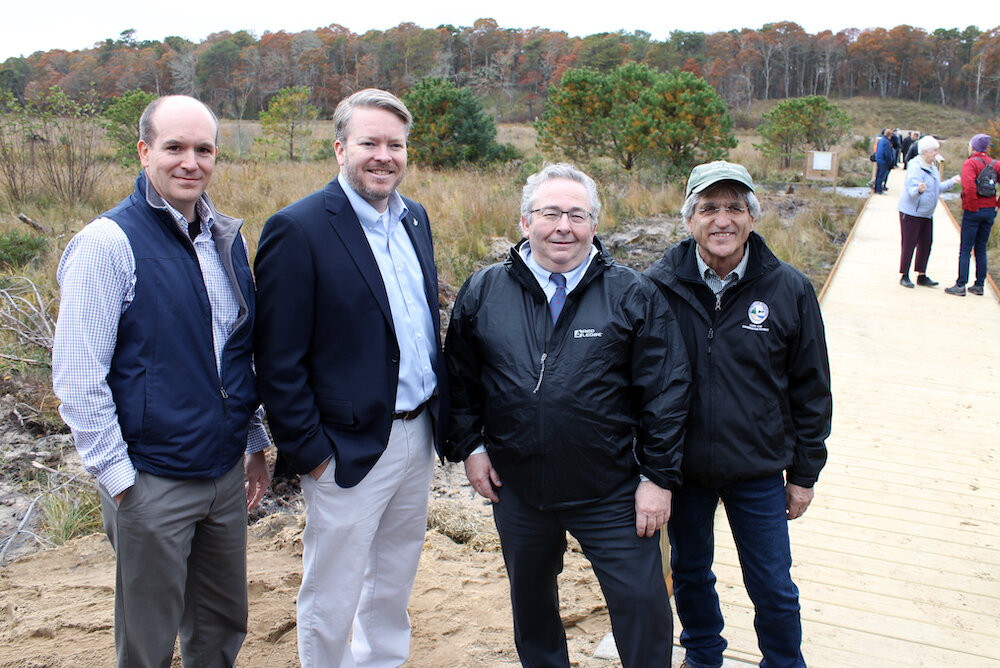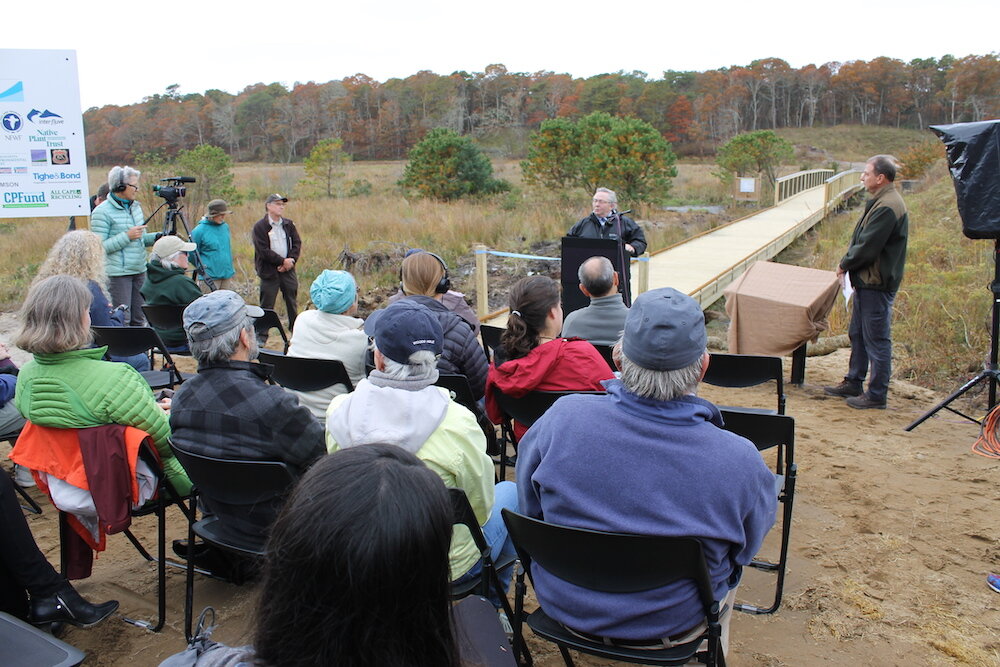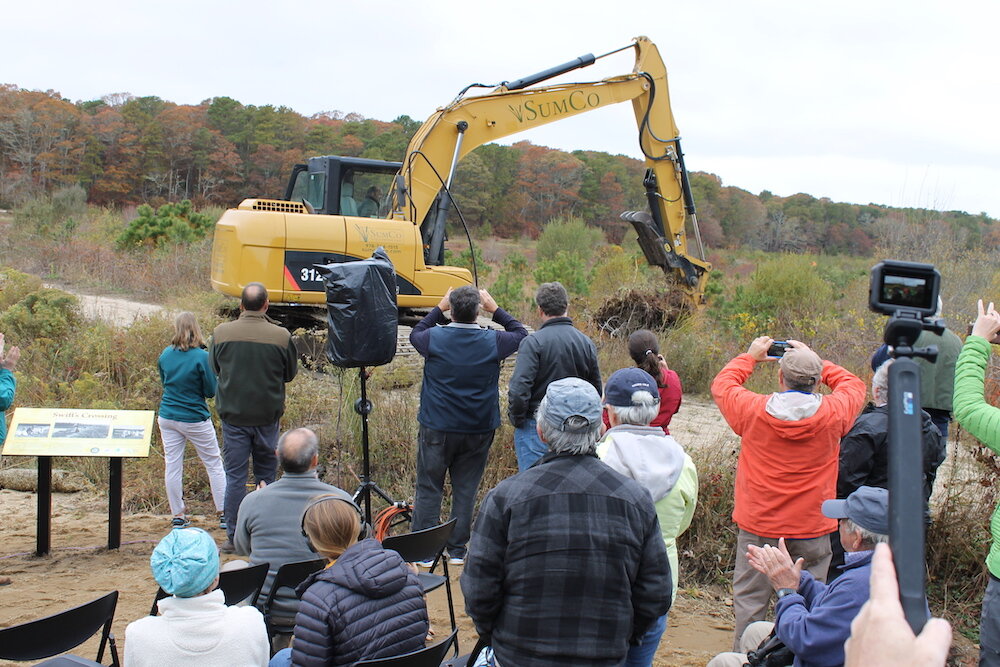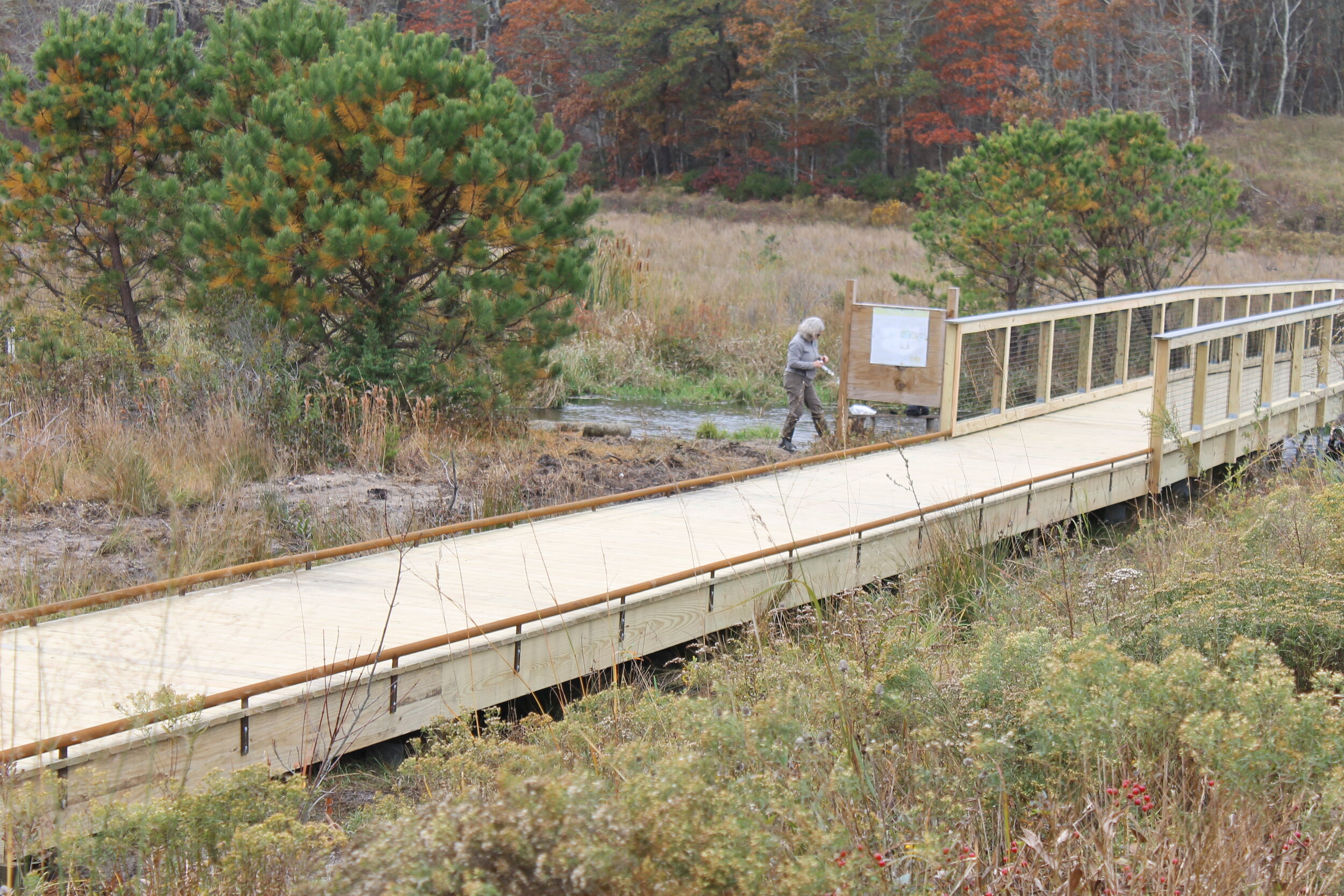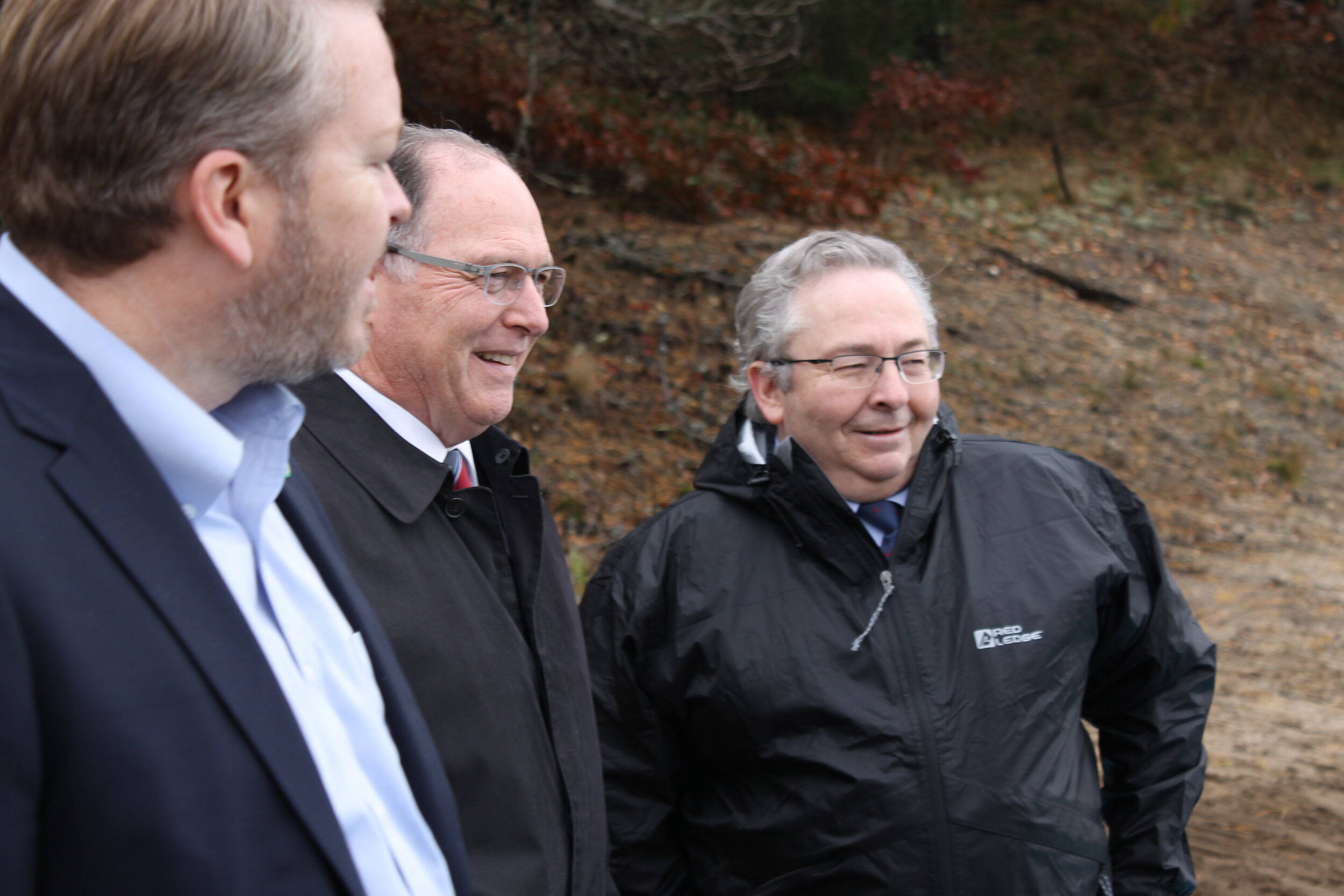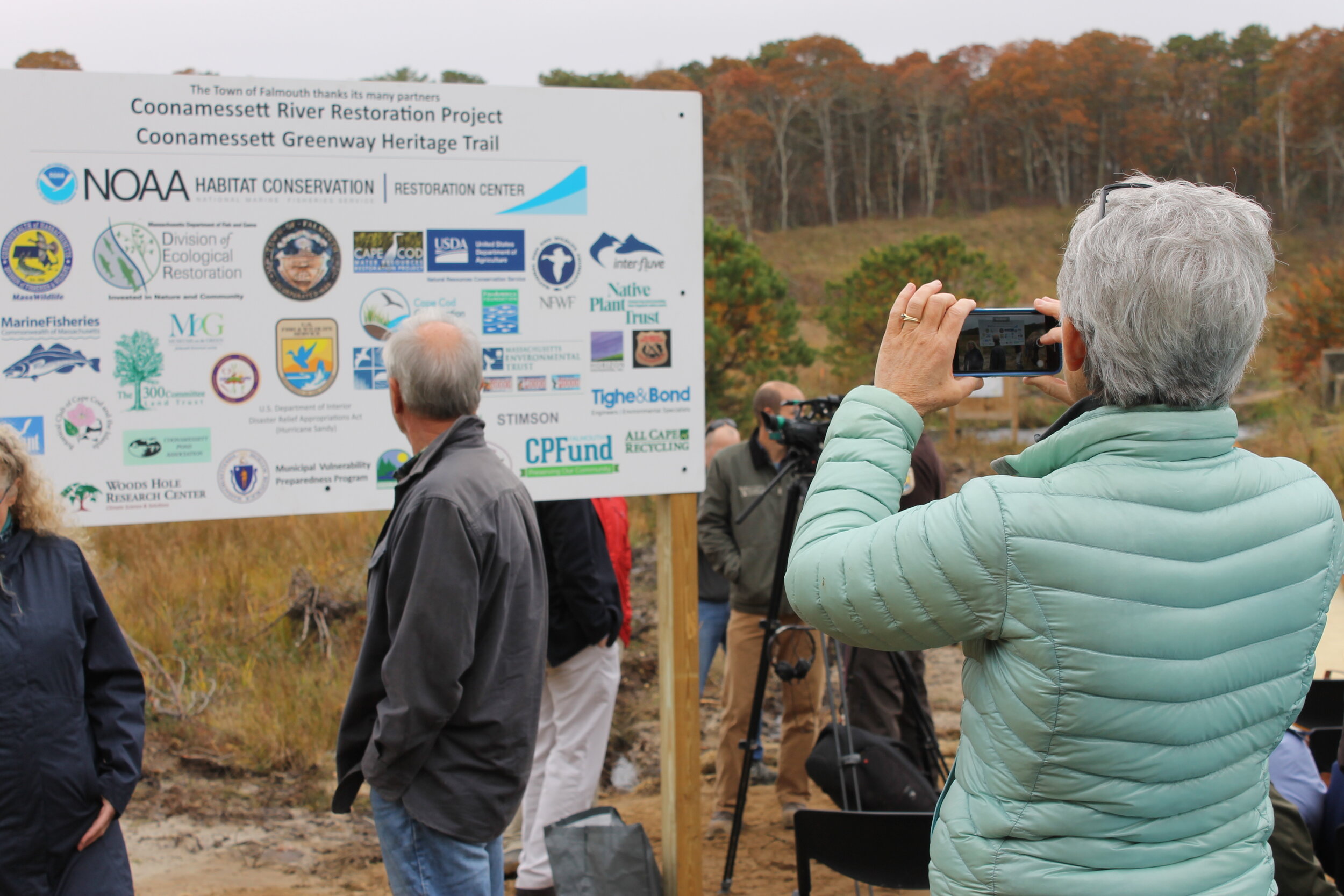On Monday, October 28 the Town of Falmouth and federal, state, regional, and local partners broke ground on the second phase of an effort to restore the Coonamessett River. The restoration project is 1 of 16 individual projects being funded in part by the Cape Cod Conservation District’s Cape Cod Water Resources Restoration Project. When complete, the $4.5 million Coonamessett River project will result in:
Two dams removed, providing river herring with full access to 2.2 miles of free-flowing river;
A new, fish passage-friendly culvert under John Parker Road;
Improved river herring access to spawning and rearing habitats in 158-acre Coonamessett Pond;
4,600 linear feet of river habitat restored and 56 acres of former agricultural cranberry bog restored to species-diverse natural wetlands.
Phase 1 of the project, completed in spring 2018, included the removal of Lower Dam, installation of a public access boardwalk, reconstruction of the river channel, and restoration of 11 acres of wetlands bordering the river channel. Phase 2 has begun with the construction of a second boardwalk, and will continue with removal of Middle Dam, replacement of the deteriorating John Parker Road culverts, and restoration of Middle and Upper Bogs to riverside wetlands. All work is expected to be completed by spring 2020.
"It’s only with broad support on the local and regional level that we are able to move great projects like this forward," said Mark Forest, chairman of the Cape Cod Conservation District. "The Town of Falmouth's continued work restoring the Coonamessett River provides much-needed habitat for fish while safeguarding the resilience of this coastal community."
"This river restoration work demonstrates that we can take action to simultaneously improve coastal resiliency and wildlife habitat," said Falmouth Town Manager Julian Suso. "This initiative is extremely complex and would not have been possible without the extraordinary expertise and determination of Dr. Betsy Gladfelter who has volunteered her time and expertise to bring these federal, state and local partners together."
Funding for the project includes grants from the National Oceanic and Atmospheric Administration (NOAA) Restoration Center (Habitat Restoration Grant), U.S. Fish and Wildlife Service (Disaster Relief Appropriations Act; Hurricane Sandy), U.S. Department of Agriculture’s Natural Resources Conservation Services through the Cape Cod Water Resources Restoration Project, Massachusetts Division of Ecological Restoration, Massachusetts Municipal Vulnerability Preparedness Program, and the Town of Falmouth Community Preservation Fund.
The U.S. Department of Agriculture’s Natural Resources Conservation Service (NRCS) has invested $10 million to restore and protect water quality on Cape Cod. Some 16 individual projects that will include installation of fish passages, stormwater remediation and salt marsh restoration are being funded as part of the Cape Cod Water Resources Restoration Project.
Steve Spear of the West Yarmouth Field Office of the Natural Resources Conservation Service commented, "This a great project and part of the NRCS Cape Cod Water Resources Restoration Project, which covers all of Cape Cod."
In the early 1900s, the herring population in the Coonamessett River numbered in the hundreds of thousands, with the Massachusetts Division of Marine Fisheries estimating an upper limit of one million fish. By 2015, however, the population had dropped to an estimated 75,000, or less.
Four primary habitat issues limit populations of herring in the Coonamessett River: passage barriers, lack of in-stream habitat, lack of floodplain connection, and lack of a vegetation canopy cover bordering and over the river. In short, the barriers prevent or delay fish from reaching historic spawning grounds in Coonamessett Pond, and the lack of in-stream habitat and riparian cover expose migrating fish to predation as they struggle to move upstream into forested areas of the watershed. By removing barriers and restoring habitat, this project aims to mitigate these limiting issues and rebuild the river's herring population. Improvements in the river herring population will be monitored through volunteer fish presence-absence counts and professional-level PIT-tag ("easy pass" transponder) monitoring.
Additional partners in this effort include: the Massachusetts Division of Marine Fisheries, Massachusetts Division of Fisheries and Wildlife, Massachusetts Environmental Trust, FishAmerica, National Fish and Wildlife Foundation, Native Plant Trust, the Association to Preserve Cape Cod, the Coonamessett River Trust, The 300 Committee, the Botany Club of Cape Cod and the Islands, the Woods Hole Research Center, the Falmouth Rod and Gun Club, and several local businesses.
